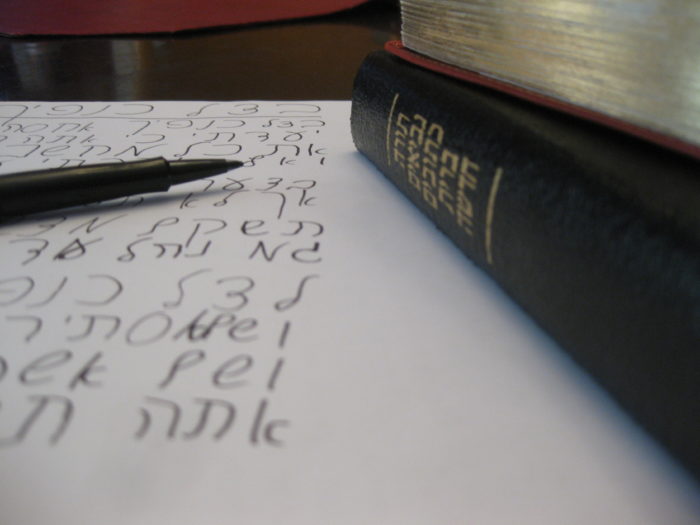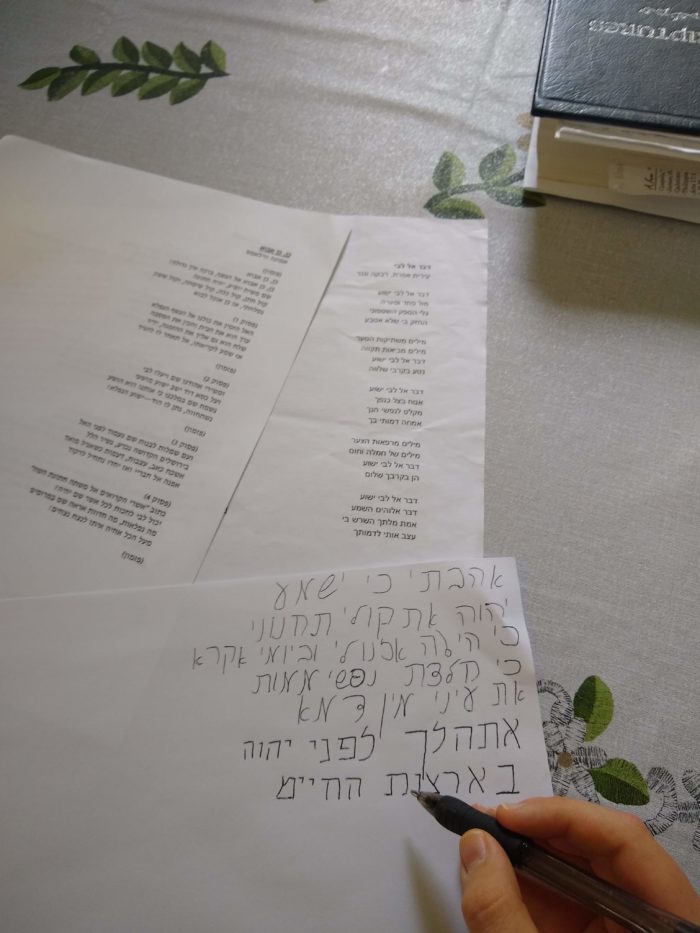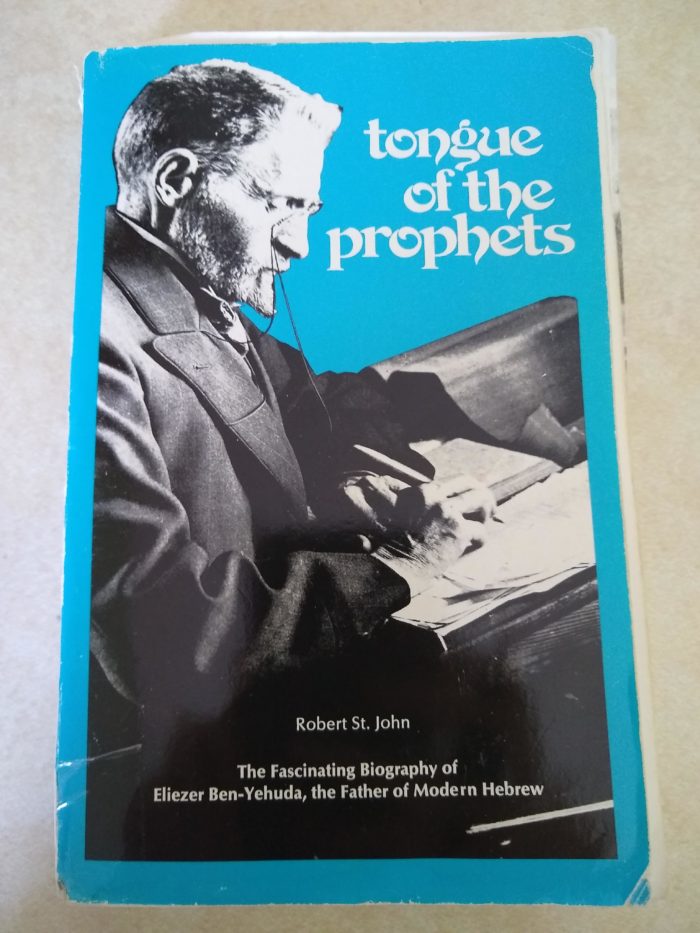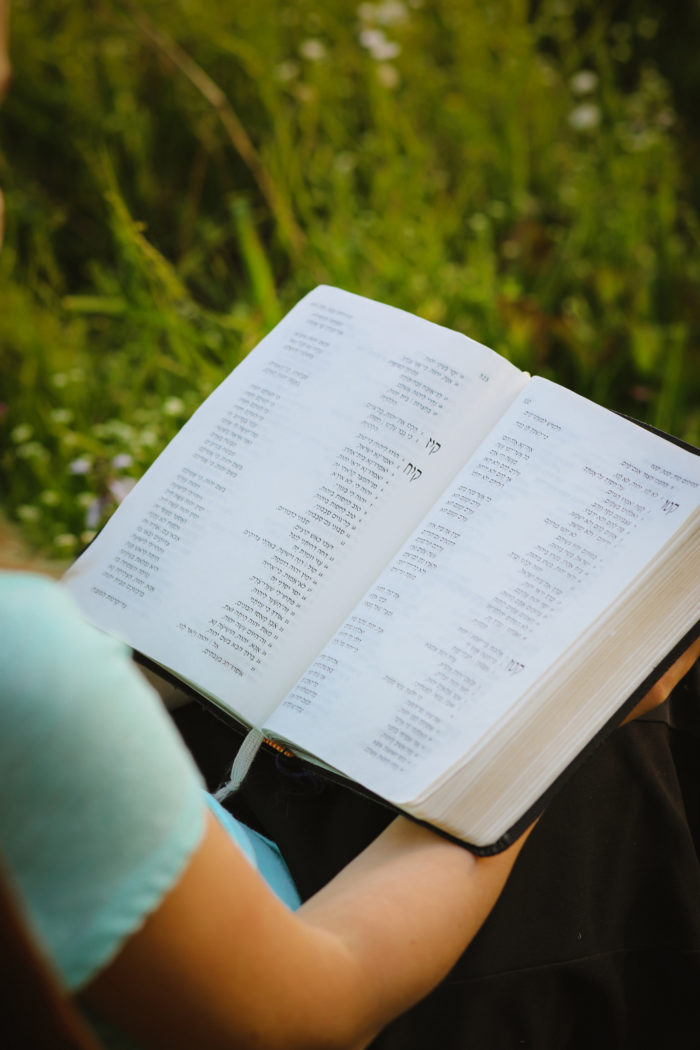
One of my passions is Hebrew. It’s a little difficult for me to put into words what the Hebrew language means to me, but I am going to try. I feel it is important for me to tell you why I love it so much.
Right now I’m writing in English. Throughout my life I have written, conversed, and learned in English. I have portrayed deep feelings in English. I’ve studied English since I was very young, and have learned to harness the power of the English language in the form of sentences, paragraphs, descriptions, poetry, and prose. I’ve learned how to bring beauty out of simple English words. All of you can understand the meaning of the sentences and words that I write. English is the medium that we use to express our ideas.
Why then do I feel that Hebrew is superior? Does not English work as well as any other language? What does Hebrew convey, or what does Hebrew do, that other languages can not?
In English, words are but a medium for expressing ideas; In Hebrew, the words themselves give you ideas. In English, the rules for conjugating words are difficult and irregular; in Hebrew, the rules for conjugation are certain and orderly. In English, any single letter has no meaning on its own; in Hebrew, even one single letter can tell you something.
You might be able to express in English everything that you can express in Hebrew, but the difference is that it would take paragraphs of English words to express what is found in a single Hebrew sentence–when you boil down the sentence to its letters, roots, ancient pictographs, etc. The very shape of the Hebrew letters can tell you things. Even right now, as I try to tell you about why Hebrew is so close to my heart, I’m certain I would have an easier time if I were writing in Hebrew, because Hebrew is packed with both obvious and hidden meaning.

In English, if you want to find the root of a word, you have to carefully study in a dictionary or some other manuscript. In Hebrew, the root, and thus the definition, of a word is right before you, inseparably tied into the word. In English, the root of a word could be from any random language, including Hebrew; in Hebrew, except for modern additives, the roots of words are purely Hebrew. The fact that Hebrew words have roots so plainly displayed helps you easily find the relationships between them. There are three letter roots and two letter roots, helping you find connections and meanings.
The English language is characterized by the mindset of Greco-western civilization, which places greater emphasis on ideas, feelings, and thoughts. But Hebrew is an action-based language. The Hebrew phrase “אנחנו מאמינים” means both “We believe” and “We are believers.” In Hebrew, when you are weeping, you are a weeper. When you are fighting, you are a fighter. You are what you do. We’ve all heard the saying that actions speak louder than words; In Hebrew, actions speak out of the words.
Now it’s time for a history lesson. How many of you know that Hebrew was a dead language for nearly two thousand years? When the Romans ransacked Jerusalem in AD 70 and scattered the Jewish people throughout the world, Hebrew became a dead language, only known by a portion of the scattered Jews. The religious Jews who still understood the language thought it was sinful to use the holy language for anything other than Bible reading and prayer. The Hebrew language was not in common use until a man named Eliezer Ben-Yehuda revived the Hebrew language nearly single-handedly. Yehovah gave him a vision, and it burned like fire within him. He understood that in order for Israel to be a nation, they needed to have Hebrew as a common language to connect the thousands of Jews who had been scattered. Now, because of his efforts, millions of Israelis speak a language that hadn’t been used for common conversation since the time of Yeshua. Are people speaking Babylonian or Egyptian or the language of the Philistines? Never before has a dead language come alive. Eliezer Ben-Yehuda was Yehovah’s instrument in preforming this linguistic miracle.

The Israelis, myself, and anyone else who understands Hebrew, speak the language that the prophets spoke, the kings spoke, Moses spoke, and Adam spoke. Most importantly, they speak the language that Yehovah spoke–both as a still small voice in the secret places and as a strong voice booming forth from Mount Sinai. It is the language that the finger of Yehovah wrote upon the two tablets of stone. It is the language He spoke as He made an unending covenant with His people. It is the language Yeshua used as He cried out on the cross, and I infer that it is the language He will use upon His return to this earth. It is the language of Yehovah, the holy language, and that is the most marvelous thing about Hebrew.
Changes happen to a language over time. Thankfully, due to the work of diligent and impassioned scholars, Hebrew has remained essentially the same over thousands of years. Elijah the prophet could enter modern Israel and understand most of the words. Isn’t that miraculous?

Yet there are many people in modern Israel who do not realize what a miracle it is that they speak Hebrew. Many don’t care about Yehovah or the Bible, and that takes away much of Hebrew’s preciousness. Such people often adopt a Greco-western mindset, like I mentioned earlier, and miss the deep meaning embedded in the Hebrew words.
That’s one of the main reasons I am writing this. I want you to understand how precious this language is. After all the terrible persecution the Jews have suffered over the years, it is only by the hand of Yehovah that this language is still being spoken in schools, markets, and homes throughout Israel and the world.
Two weeks ago, Yehovah blessed me with an opportunity to talk to a young native Israeli. I looked at that child and understood as he spoke to me in the language of our fathers; my heart melted. I feel like crying right now when I think of it, because in that moment, as he spoke, I was able to see firsthand the restoration of my people Israel. Hardly more than a hundred years ago, there was not a single child who spoke Hebrew as his mother language. Yet I was able to talk with this native-speaking child in the holy language. I got to take part in the miracle. I don’t think I’ve been quite the same since that moment.
Hebrew is a language of relationship, unity, and connection. It is a language that connects you to Yehovah, His people, and His land. It is a language that connects the past, the present, and the future.

I understand that many Americans have excuses as to why they don’t want to study Hebrew. They say they are too old, too busy, or not smart enough. They are afraid of failure, or they simply don’t want to make it a priority. But who said an old person can’t learn a language? Just because you might not be smart enough to become fluent in a language does not mean that you are not smart enough to study. And please don’t think that if you try, you will fail. You will learn at least a few special things as you study.
All that being said, I do understand that many never chose to learn Hebrew. If you don’t want to learn, that is your choice. I am merely telling you the reasons that I did choose to learn Hebrew–and why it is my favorite language, my passion.

English annoys me with how confusing it is. Hebrew, however, is a breath of fresh air. It makes my heart sing. Whenever I open my Hebrew Bible, the depth of meaning found in the Bible combined with the depth of meaning found in the Hebrew language provides such a richness to Yehovah’s precious book. In my mind, no English words, or even English poetry, can compare with the beauty of the Hebrew language. My heart greatly yearns for the day that I will be in Israel speaking Hebrew with my brothers. I know that I will likely not get that opportunity until the Savior returns, so my heart cries out to my King in song, in the language that both He and I love:
“So, blessed is your arrival and Your kingdom come.
Our Redeemer, our King is returning!
And we will rejoice in hope that will not fail.
He will come; our Master, our King will come.”
-A translation from the song “He Will Come” by Sheli Myers
אז ברוך בואך ותבוא מלכותך
גואלנו מלכנו חוזר
ונגיל בתקווה שלא איכזבה
הוא יבוא; אדוננו מלכנו יבוא
מתוך השיר “יבוא,” שלי מאיירס
“And then I will return to the nations a clean language, for all of them to call on the Name of Yehovah, to serve him with one shoulder.”
–Zephaniah 3:9
כי אז אהפך אל העמים שפה ברורה לקרוא כלם בשם יהוה לעבדו בשכם אחד
צפניה ג:ט

Great blog post, Faith. You should seriously try to find other Israelis/Hebrew speakers who would like to video chat online. Being able to communicate and use a language in active speech is such a great way to further grow in learning a language.
Thank you! I am trying to find an Israeli friend to write/speak with, but haven’t found one quite yet. I would love to be able to converse in Hebrew! 😀